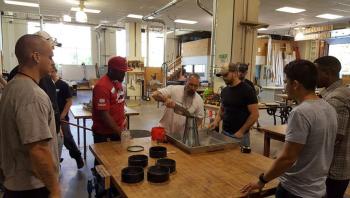Bristol Station helps probationers, parolees reintegrate into society
Bristol Station helps probationers, parolees reintegrate into society
FOR IMMEDIATE RELEASE (17-72)
CONTACT Cara Wilwerding, Communications Manager
| cara.wilwerding@nebraska.gov
Note: This is the fifth of an eight-part series about Vocational and Life Skills programs funded by LB907. Follow along to learn more about the programs’ goals, expectations and successes.
Dec. 14, 2017 (Lincoln, Neb.) – Finding a suitable place to live is key to a person’s ability to successfully reenter society after leaving prison. However, while securing housing is a prerequisite for probation and parole and a necessity for anyone reentering a community, it is not always an easy task.
“When you get released, things can come at you really quickly and it can get overwhelming for a lot of people,” said Steve Fannon, Nebraska Department of Correctional Services (NDCS) reentry program manager. “Bristol Station provides a safe and supportive living environment where participants can focus on establishing a foundation for long-term success.”
Bristol Station is a 65-bed residential reentry center located in Hastings, Neb. The center’s goal is to reintegrate state probationers and parolees back into society while simultaneously reducing recidivism.
The facility serves both men and women transitioning back into the community. A minimum of a 90-day commitment, agreement to facility-wide rules and participation in programming is required and expected from every resident. The rules are the same for everyone, but each person’s needs are different.
“We’ve had individuals stay for up to six to eight months,” said Angela LaBouchardiere, executive director of Western Alternative Corrections Inc, which owns Bristol Station. “Some people require an additional amount of time to get back on their feet and others don’t need as much.”
Facilitators use evidence-based practices to deliver individualized programming designed to target each person’s specific risks and needs. Some program subjects include Moral Reconation Therapy, anger management, transition skills, parenting, job readiness and conflict resolution. Bristol Station also engages community resources for substance abuse and mental health issues.
Residents are encouraged to pursue gainful employment, visit with family and friends and fulfill necessary commitments outside of the facility. Case managers approve and monitor resident movement and employ accountability measures such as electronic monitoring, drug testing, video surveillance and person and property searches. Residents check in and out of the facility throughout their day.
The relationships Bristol Station has formed in the western Nebraska community speak volumes to their success, NDCS reentry administrator Grace Sankey-Berman said. The community has a high need for workers, and being able to relocate from more populous cities also has its advantages. Living somewhere new may help residents cut ties with unhealthy people and habits from their lives before prison.
“It’s a very structured environment,” Sankey-Berman said of Bristol Station. “It works well for more challenging cases; people who may need more structure.”
LaBouchardiere said the best part about her job is seeing a resident transform throughout his or her stay.
“Being able to provide the guidance and services to help people become the best versions of themselves is very rewarding,” LaBouchardiere said. “I want them to rediscover their value and worth.”

